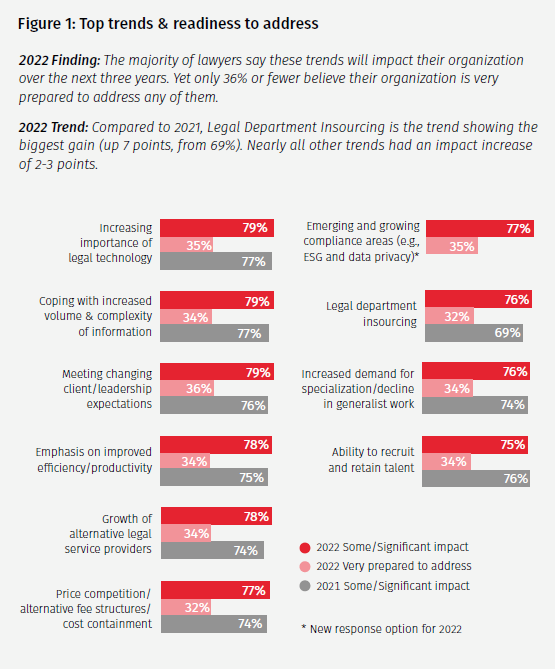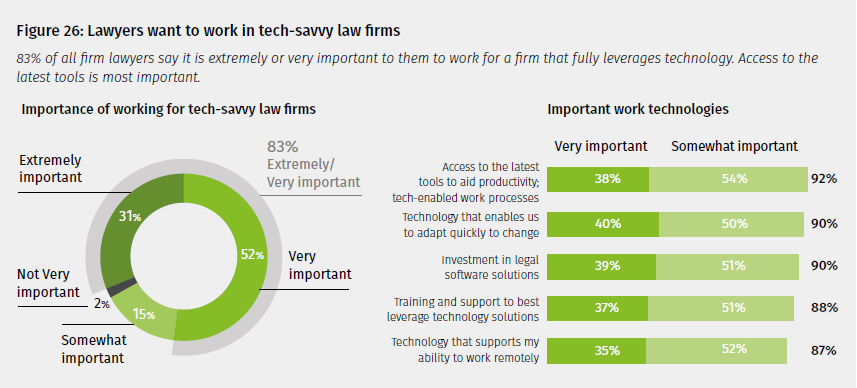Legal professionals face greater pressure than ever before, driven by the “VUCA” environment of volatility, uncertainty, complexity and ambiguity, but firms that are well-equipped for the future are those that are optimizing their people, processes and technology through a path of continuous improvement.
So says the 2022 edition of The Wolters Kluwer Future Ready Lawyer, a survey report that Wolters Kluwer Legal & Regulatory U.S. has published for each of the last four years. It polled 751 legal professionals from the U.S. and 10 European countries to measure how well prepared organizations are to drive higher performance.
 Among its key findings, the report says that the legal professionals it surveyed agree that three trends will have the most impact across the legal sector over the next three years:
Among its key findings, the report says that the legal professionals it surveyed agree that three trends will have the most impact across the legal sector over the next three years:
- The increasing importance of legal technology – 79%.
- Coping with the increased volume and complexity of information – 79%.
- Meeting changing client and leadership expectations – 79%.
But even as they recognize those trends, just 36% or fewer lawyers believe their organization is very prepared to keep pace with any of these trends.
Something else that will significantly impact lawyers are new and growing areas of law, the survey found. Specifically:
- 77% of survey respondents report that coping with emerging and growing compliance areas, such as environmental, social and governance (ESG) and data privacy, is a significant trend.
- 56% of corporate lawyers and 45% of law firm lawyers report increased demands for ESG guidance over the past year. Most say their organization is not very prepared to keep up.
Another major trend identified by this year’s report relates to how legal work gets done and who is doing it:
- Among those in corporate legal departments, 84% report greater use of contract staff, greater use of non-legal staff to perform work, and greater use of alternative legal service providers.
- Among those in law firms, 81% report greater use of third-party or outsourced resources, 78% report greater use of non-legal staff to perform work and greater use of contract staff, and 77% report more client self-service.
The findings build on prior years’ survey results relating to performance trends, which show that across a wide range of areas, legal organizations that fully leverage technology outperform organizations that do not.
In particular, the survey again this year found that law firms that fully embrace technology are more profitable than those that do not, with 63% of these so-called Technology Leading firms reporting that their profitability increased over the past year, compared to 46% of other firms.
Which technologies do legal professionals consider most important?
- Those in law firms ranked the most important technologies as document management, cybersecurity and encryption tools, and digital court proceedings.
- Those in legal departments listed: legal matter management, contract management software and contract analytics; document management; cybersecurity and encryption tools; e-signature tools, and entity management.
The survey asked about the “great resignation” over the past year and found a tangible impact on the legal profession:
- 86% of corporate lawyers and 70% of law firm lawyers say the great resignation has had a very or somewhat significant impact on their organization.
- 70% of corporate lawyers and 58% of law firm lawyers say they are very or somewhat likely to leave their current position in the next year.
Less than a third of legal organizations said they are well-prepared to handle the talent churn. But the majority of respondents agree that technology is a critical factor in retaining and attracting talent: 87% of corporate lawyers and 83% of lawyers in law firms say it is extremely or very important to work for a legal organization that leverages technology.

As in past years, the survey found that technology capabilities are important to clients’ evaluation of both existing and future firm relationships:
- 91% of legal departments say it will be important for the law firms they use to fully leverage technology.
- 97% of legal departments do or will ask firms they are considering to describe the technology they use to be more productive and efficient.
- The top reason for which legal departments would switch law firms is if the firm did not demonstrate efficiency and productivity. Only 38% of corporate lawyers say their current firm uses technology well to drive productivity and efficiency.
“The data is clear: Technology Leaders thrive,” the report concludes. “Year after year, they outperform other organizations across several important metrics and demonstrate why investing in and applying the right technology matters.”
The full survey report, which includes further findings across law firms, corporate legal departments, technology, talent and trends, as well as special sections on the impact of ESG and insights from legal industry luminaries, can be downloaded at Wolters Kluwer Future Ready Lawyer 2022.
Related:
- LawNext: Defining the ‘Future Ready’ Lawyer, with Wolters Kluwer VPs Martin O’Malley and Dean Sonderegger.
- Pandemic Accelerated Tech’s Importance, But Firms Remain Poorly Prepared for Tech Future, Survey Says.
- Growing Importance of Tech is Top Trend in Legal, But Few Feel Prepared for It, Wolters Kluwer Survey Finds.
- LawNext Episode 49: Dean Sonderegger of Wolters Kluwer on the ‘Future-Ready Lawyer’.
- Tech-Savvy Firms More Profitable Now, More Prepared for the Future, Finds Survey of U.S. and EU Legal Professionals.
[Disclosure: The Future Ready Lawyer Survey report included a section of “Insights from Luminaries” on trends in technology and legal sector transformation. I was among those who contributed commentary. I received nothing of value for my contribution.]
 Robert Ambrogi Blog
Robert Ambrogi Blog